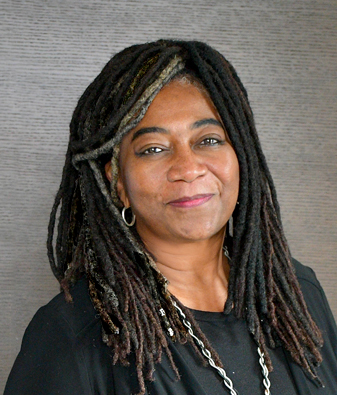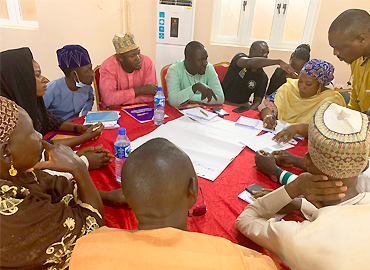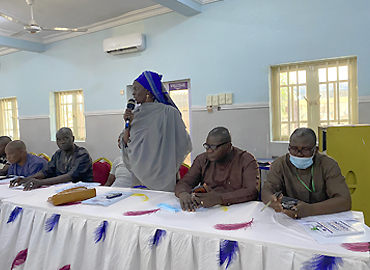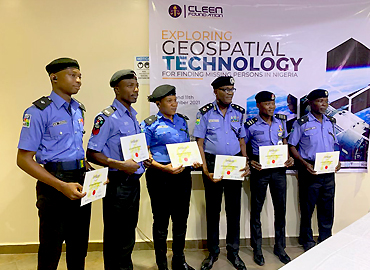Many of the Fulani of northern Nigeria are nomadic herders who have been driven from their traditional grazing lands by environmental degradation, forcing them to encroach on farmlands — and into violent clashes with farmers.
“In one case, the cattle destroyed a farm, and the farmer responded by killing some of the cattle,” explains Kamari Clarke, distinguished professor at the Centre for Criminology & Sociolegal Studies and the Centre for Diaspora & Transnational Studies in the Faculty of Arts & Science at the University of Toronto. “The herders reported this to their community up north, and self-appointed vigilantes attacked the community down south in retaliation, abducting six people. Then the farmer mobilized his own group to protect farms in the area.
“The problem is that when farmers lose their cattle and crops, their livelihoods, their loved ones — an unending cycle of violence is born. People respond to violence with more violence because sometimes they feel that there's nothing else to lose.”

The challenges are dire. In many regions in Nigeria, state law enforcement and military and peacekeeping groups have failed to protect villagers from mass violence. Issues with borders, governance from British colonial annexation and ongoing competition for resources led to a new turn since Nigeria’s independence in 1960, which saw successive military coups and sustained inequality throughout the region. In the last decade, economic decline, political manipulation, and ethnic and religious rivalries have given way to extremist groups like Boko Haram, and a staggering number of robberies, hijackings, abductions and murders.
“With a breakdown in the social fabric of daily life and the inability of external actors to make a substantial difference, who better to figure out solutions to stop cycles of violence than the people themselves who live in those communities?” says Clarke.
This is the motivation behind the Early Warning, Early Response (EWER) project, a grassroots human rights initiative led by principal investigator Clarke, local implementing partners and human rights NGO CLEEN Foundation Nigeria, and project advisor and U of T PhD candidate Wumi Asubiaro Dada. It was funded by the U.S. Department of State Bureau of Conflict and Stabilization Operations, Clarke’s Transnational Justice Project at University of California, Los Angeles, as well as a Social Science and Humanities Research Council (SSHRC) Insight Grant.
A new report shows how the EWER project empowered locals to defend their villages and make strategic decisions that have long-lasting impact for conflict prevention, including women who are traditionally left out of peacebuilding practices.
“Think of it as an innovative community policing initiative built from the ground up,” says Clarke.

Working in the northern states of Kaduna, Plateau, Taraba and Zamfara, the project brought together community members, youth, women, elders, members of traditional councils and strategic figures in local government to elect members to the EWER stakeholders forum. The forum members share information with elected community safety partners (CSPs), who alert community members of pending or initial attack, verify intelligence, assess the nature of violence, share information through funded technology apps, rally community members to respond strategically, and when relevant participate in the de-escalation of violence. State coordinators (one project intermediary in each state) collect community reports, pursue the deployment of resources needed and communicate weekly developments to CLEEN Foundation and Clarke’s team.
When developing the EWER team, the project coordinators found how important it is to engage women and youth in community protection.
Clarke says that including women in the EWER forum was initially met with resistance from various community leaders: “It went against the patriarchal idea that women should be protected by the men — they would ask: why should they be out there on the front line, risking themselves when children need to be cared for?”

However, women involved in the project proved to have a profound impact on the success of the EWER system because they used their strong social ties to communicate when there was danger, and they helped their communities to heal following extreme loss. The Nigerian government even recognized this impact, appointing a female CSP to the governmental advisory council on violence.
EWER job opportunities are also important for youth who, because of extremely high youth unemployment rates in the north, are at high risk of getting involved in vigilante violence.
Through Clarke and CLEEN Foundation’s initiative, EWER forum members, CSPs and state coordinators are trained in conflict analysis, sensitivity, “do no harm” ethical principles, risk mitigation and violence response planning. They are also taught how to use technology like artificial intelligence-driven geospatial technologies, the CLEEN mobile app and the Esri Incident Reporting Platform to share, document and protect data about violence, and enable geo-tracking.
Together, they consult on how to handle an imminent threat of violence.
“These threats could be armed bandits abducting people from the community, the burning of land and property, farmer-herder conflicts and so forth” says Clarke. “There could also be a retaliation for wrongdoing.”
“Protecting life comes first. Sometimes fighting to protect village homes without the resources is not the wisest decision to pursue and it’s important to flee, while other times staying in place and engaging in political negotiations with the right stakeholders is possible. Our goal is to support community members to alert each other of developments, assess the nature of violence and work toward achieving shorter- and longer-term solutions toward peace,” says Clarke.

Which brings us back to the violent clash between the Fulani and farmers.
When EWER members assessed the confrontation, the focus was on property: who destroyed what. Yet from the herders’ perspective, land should be available to all. The issue was eventually resolved with the farmer given money for his loss, and the herders given free passage through a designated grazing route — putting a stop to what would have been a never-ending cycle of violence.
“It’s an example of historical ways of living coming up against colonial borders and contemporary ways of organizing ownership,” says Clarke. “All people needed was a recognition that there was harm done, and a resolution that addressed this damage. Without the EWER forum and these mechanisms for discussion and transmission of information, violence would have been the conclusion, which could have led to people being forced to flee their community and move into an internally displaced persons camp.”
Two years after its launch, the EWER project has been deemed an overall success — empowering communities, bringing women and youth into the fold, and producing new possibilities for the resolution of deep-seated problems accelerated by land dispossession and failed promises of modernity. It’s now reached the point where the communities involved are self-operating, with villagers training one another and carrying on the work using the acquired tools and practices. Clarke hopes that this program’s findings will support the development of early warning systems for conflict prevention and peacebuilding in other communities in dire need.
Yet even this is only part of the story. Clarke insists that these forms of community mobilization can only go so far without the rectification of deep political and economic inequalities: “States need to put mechanisms in place for widespread educational access, employment opportunities, youth programming and food and housing security. It is only through this investment in people that we can achieve the conditions for peaceful growth.
“We need community-based institutions like EWER forums that operate from the bottom up and benefit the people that they are meant to support. This is how we implement grassroots solutions to stop cycles of violence.”

